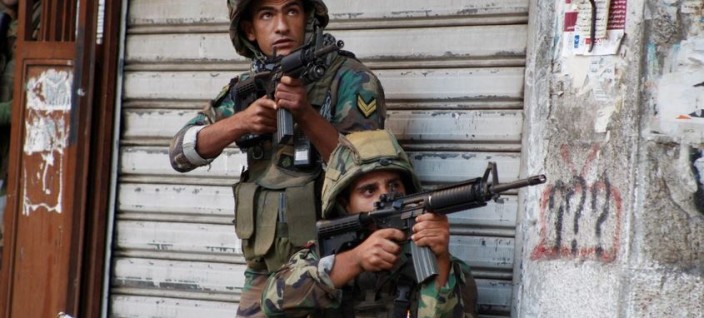Genocide Watch exists to predict, prevent, stop, and punish genocide and other forms of mass murder. Our purpose is to build an international movement to prevent and stop genocide.
Staff Login
Rivals Tehran, Riyadh pledge billions to Lebanon’s army
Rivals Tehran, Riyadh pledge billions to Lebanon’s army
By Hugh Naylor, The Washington Post
4 November 2014
Saudi Arabia and Iran have offered apparently competing aid packages to Lebanon’s small and modestly armed military as it confronts increasing attacks at home by militants with ties to extremists fighting in Syria’s civil war.
The pledges total billions of dollars’ worth of mostly light arms and underscore mounting concern among the Persian Gulf foes about the stability of a country where both have invested significant resources.
The aid is on top of the more than $1 billion spent by the United States since 2006 to train and equip the 65,000-member military, which has limited authority and yields to Iran-backed Hezbollah, Lebanon’s powerful Shiite militia. Hezbollah supports Syrian President Bashar al-Assad in his fight against Saudi-backed rebels.
Many suspect that the offers of assistance from Riyadh and Tehran are simply another instance of one-upmanship between the Sunni and Shiite powerhouses.
“You have to look at this as a regional issue, as part of their broader competition for influence,” said Elias Hanna, a retired Lebanese army general.
Lebanese army soldiers carry the coffin of Captain Jihad al-Haber, who was killed during fighting between Lebanese army soldiers and Islamist militants in Tripoli. (Sharif Karim/Reuters)
“When they give to the Lebanese army, they know this means they can have hands in its politics and how it’s trained and equipped,” he added.
Motivations
In December, Riyadh agreed to give $3 billion worth of French-made weapons to Lebanon’s military at a still-unspecified date. It also granted $1 billion in emergency aid to the country’s military and intelligence agencies in August after militants linked to extremists in Syria briefly captured the Lebanese border town of Arsal. Combined, the pledges amount to more than double the Lebanese military’s estimated annual budget.
On Tuesday, France and Saudi Arabia signed a contract for the $3 billion deal, French Foreign Minister Laurent Fabius said in a statement that did not give details on the types of weapons involved or when they would be delivered to Lebanon.
During a visit to Beirut in September, the secretary of Iran’s Supreme National Security Council, Ali Shamkhani, responded with an arms offer from Tehran. According to Lebanese media reports, that consists primarily of antitank weapons, artillery and heavy machine guns.
Iranian support for Lebanon’s military would seem to complicate a desire shared by Washington and Riyadh to use the army as a counter to Hezbollah. Iran relies heavily on the group, which was allowed to retain its weapons to confront Israel as part of a 1989 agreement that ended Lebanon’s 15-year civil war.
For the moment, Tehran’s interest in countering the advances in Iraq and Syria by Islamic State militants has aligned with the concerns of Washington and Riyadh. The U.S.-led coalition carrying out airstrikes against the extremist Sunni group in Iraq and Syria has reportedly agreed not to target forces loyal to Assad. Strikes on his forces also could hit fighters from Hezbollah and Iran, both firm allies of Assad.
Featured Image: Lebanese army soldiers carry their weapons during clashes with Islamist militants in Tripoli on Oct. 25. Copyright 2014, Stringer/Reuters























































